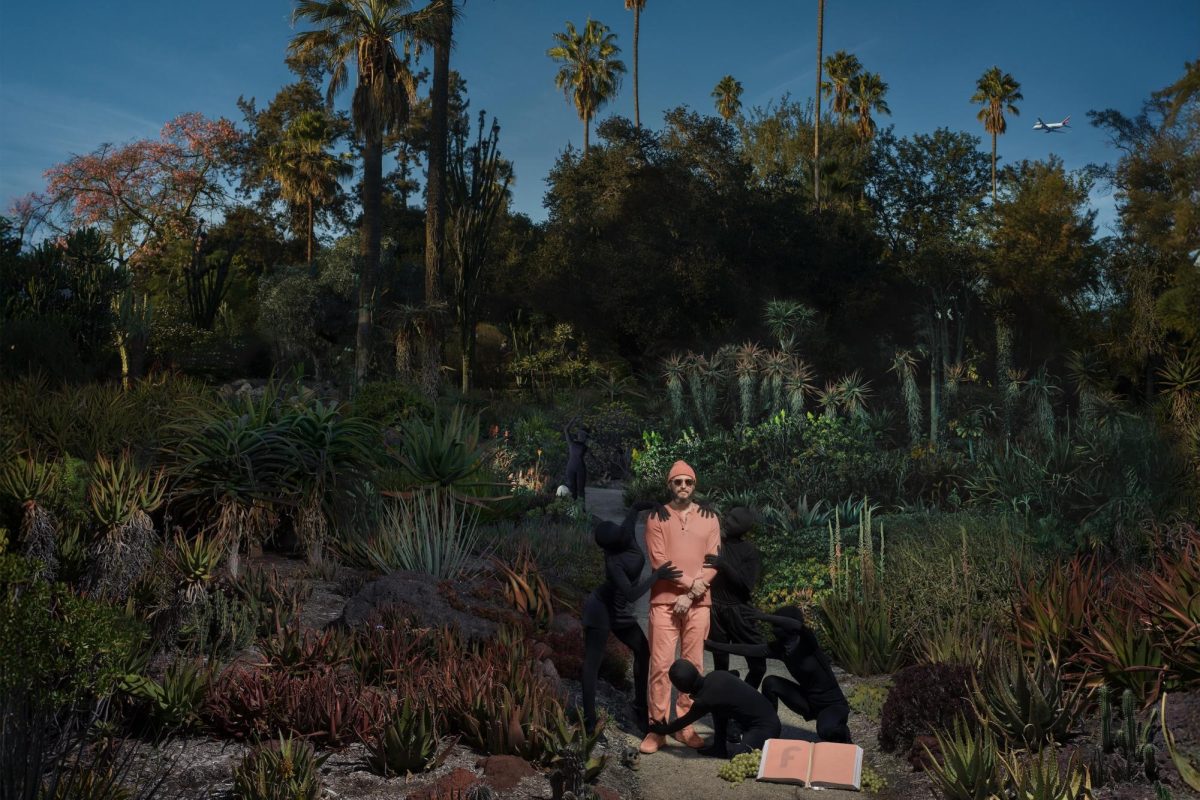On “SABLE, fABLE,” Bon Iver steps into newfound light. Justin Vernon — the artist who created the project — has been known for his melancholy music since 2001. His most well-known songs, like “For Emma,” cut the listener to their soul — and his masterful production brings his devastating lyrics home. He described his new album as a two-parter in an interview with The New York Times Popcast, saying that “SABLE” signifies the darkness while “fABLE” is “windows down, sunshine.”
The first four songs of the album were released as an EP titled “SABLE” in October 2024 and represents an intense darkness that Vernon eventually sheds. The word “sable” means dark and black, and the first four songs certainly embody this. In the acoustic guitar-based “S P E Y S I D E,” Vernon details his regrets, singing, “As I fill my book / What a waste of wood / Nothing’s really happened like I thought it would.” These dark lyrics are complemented by Vernon’s folky, lilting falsetto — adding even more melancholy and softness to the track.
On “AWARDS SEASON” — the fourth and last song from “SABLE,” Vernon croons, “But I’m a sable / And honey, us the fable,” warning someone close to him of pervasive internal darkness that threatens to undermine the closeness of their relationship. Vernon uses very few instrumentals on this track, but lets his mournful lyrics carry the listener from loss to rekindled hope. He sings, “Oh, just take my hand / And place it on your blame / And let it wash away / With you I will remain.” A cacophony of beautiful horns flood into a brief instrumental break, and Vernon closes out “SABLE,” with a note of hope.
However, in the last nine songs of “SABLE, fABLE,” Vernon charts into unknown territory: his emergence into joy. And it’s perfect. In “Short Story” Vernon maps the transition into happiness, beginning with sparkling, dizzying instrumentals and whispered lyrics under layers of production — until, in a moment of a cappella singing as if almost under his breath, Vernon says, “That January ain’t the whole world.” Then, the song cracks open, bass and backing vocals flooding in. Spring has come.
In the following songs, Vernon plays with production, vocals and lyrics to create fun. “Everything Is Peaceful Love” is a danceable track, with Vernon showing how “every little thing is love / And right with me” through instrumental breaks and small whoops throughout the bridge. “Walk Home” provides some of Vernon’s signature non-traditional production, where he plays with autotune and other methods of production to create higher-pitched, varied vocal effects. This track is Vernon’s debut into lovesick lyrics without his usual melancholy as he says, “No, we don’t need no window curtains / And we can let the light come in,” and later, “Of this I am certain of / You was made for me.” Vernon shows unadulterated joy in this track, with a groovy bass accompaniment.
“SABLE, fABLE” includes features from Dijon, Flock of Dimes and Danielle Haim across two tracks: “Day One” and “If Only I Could Wait.” “Day One” is an easy listen and definitely Vernon’s most pop-esque song on the album, but the features don’t add much to the track. He adds so much variation to his own voice through his vocal hyper-editing, and Dijon and Flock of Dimes’ presence don’t differ enough from that of Vernon to make them stand out. Vernon’s solo project is so pure and distilled that adding others into the mix only dilutes his concentrated art form.
However, in “If Only I Could Wait,” Haim’s feature is a welcome break from Vernon’s lilting falsetto. When her cool, sultry voice casually takes over the second verse, the song gains depth through variation. If the features present in “Day One” had added the same levels of variation as Haim, the album’s collaborations would have held more potential and merit.
Vernon closes out the album with “Au Revoir,” a fully instrumental track. Piano gently begins and swells as strings join the mix, then finally quiets, leaving a few notes on the piano and an overhead, high-pitched tone — both ceasing when they hit the same note. Perhaps the high-pitched tone — an uncomfortable nuisance to an otherwise peaceful ending — represents the darkness Vernon is learning to live with, and the piano is the light. In “SABLE, fABLE,” maybe they can exist together.
Contact Rory Lustberg at [email protected].
























































































































































